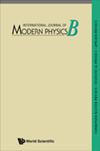Nonlinear metaheuristic cost optimization and ANFIS computing of feedback retrial queue with two dependent phases of service under Bernoulli working vacation
IF 2.8
4区 物理与天体物理
Q2 PHYSICS, APPLIED
引用次数: 0
Abstract
Today, with real-life problems, modeling is a primary step in organizing, analyzing and optimizing them. Queueing theory is a particular approach used to model this category of issues. Space constraints, feedback, service dependency, etc. are often inseparable from the issues they create. In light of this objective, this research presents a model and analysis of the steady-state behavior of an [Formula: see text] feedback retrial queue with two dependent phases of service under a Bernoulli vacation policy. The service times for the two stages are often independent in normal queueing frameworks. We presume that they are dependent random variables in this case. Indeed, this dependence is one-way (i.e., the service time of the second phase has no effect on the service time of the first phase). Yet, the first phase service time has an impact on the second phase service time. In order to determine the steady-state probabilities and probability-generating functions (PGF) for the different states, the supplementary variable technique (SVT) was utilized. Furthermore, a broad range of performance metrics had been established. The generated metrics are then envisioned and validated with the aid of graphs and tables. Additionally, a nonlinear cost function is constructed, which is subsequently minimized by distinct approaches like particle swarm optimization (PSO), artificial bee colony (ABC) and genetic algorithm (GA). Furthermore, we used certain figures to examine the convergence of these optimization methods. Finally, validation outcomes are compared with neuro-fuzzy results generated with the “adaptive neuro-fuzzy inference system” (ANFIS).伯努利工作假期下具有两个服务依赖阶段的反馈重审队列的非线性元搜索成本优化和 ANFIS 计算
如今,对于现实生活中的问题,建模是组织、分析和优化这些问题的首要步骤。队列理论是用于对这类问题进行建模的一种特殊方法。空间限制、反馈、服务依赖性等往往与它们造成的问题密不可分。根据这一目标,本研究提出了一个模型,并分析了伯努利休假策略下具有两个服务依赖阶段的[公式:见正文]反馈重审队列的稳态行为。在正常队列框架中,两个阶段的服务时间通常是独立的。在这种情况下,我们假定它们是相依的随机变量。事实上,这种依赖是单向的(即第二阶段的服务时间对第一阶段的服务时间没有影响)。然而,第一阶段的服务时间会对第二阶段的服务时间产生影响。为了确定不同状态的稳态概率和概率生成函数(PGF),采用了补充变量技术(SVT)。此外,还确定了一系列性能指标。然后,借助图表对生成的指标进行设想和验证。此外,还构建了一个非线性成本函数,随后通过粒子群优化(PSO)、人工蜂群(ABC)和遗传算法(GA)等不同方法将其最小化。此外,我们还利用一些数据来检验这些优化方法的收敛性。最后,将验证结果与 "自适应神经模糊推理系统"(ANFIS)生成的神经模糊结果进行比较。
本文章由计算机程序翻译,如有差异,请以英文原文为准。
求助全文
约1分钟内获得全文
求助全文
来源期刊

International Journal of Modern Physics B
物理-物理:凝聚态物理
CiteScore
3.70
自引率
11.80%
发文量
417
审稿时长
3.1 months
期刊介绍:
Launched in 1987, the International Journal of Modern Physics B covers the most important aspects and the latest developments in Condensed Matter Physics, Statistical Physics, as well as Atomic, Molecular and Optical Physics. A strong emphasis is placed on topics of current interest, such as cold atoms and molecules, new topological materials and phases, and novel low dimensional materials. One unique feature of this journal is its review section which contains articles with permanent research value besides the state-of-the-art research work in the relevant subject areas.
 求助内容:
求助内容: 应助结果提醒方式:
应助结果提醒方式:


